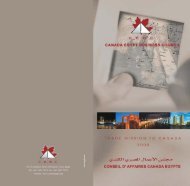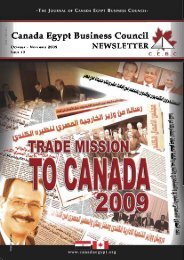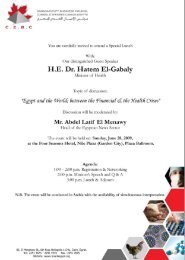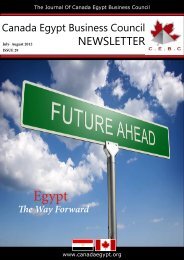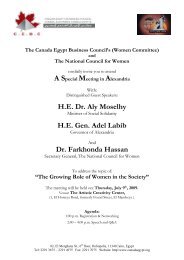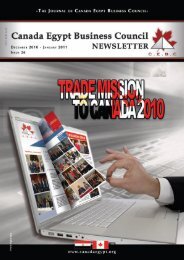NEWSLETTER - Canada Egypt Business Council
NEWSLETTER - Canada Egypt Business Council
NEWSLETTER - Canada Egypt Business Council
You also want an ePaper? Increase the reach of your titles
YUMPU automatically turns print PDFs into web optimized ePapers that Google loves.
CEBC<br />
Indepth<br />
The <strong>Egypt</strong>ian revolution started with a facebook group calling for demonstrations<br />
against police brutality and corruption and ended up ousting one of the regions –<br />
and the world’s longest withstanding regimes. Now, that the Mubarak’s vice president,<br />
Omar Suleiman, was unable to garner sufficient notarizations to enter the race, the same<br />
scenario will not reoccur for <strong>Egypt</strong>. The country is about to witness, for the first time, in<br />
its 7000 year-history, free and fair elections. Of all the aspirations of the <strong>Egypt</strong>ian people<br />
in this new era, rising above the dreadful poverty line comes first. With national reserves<br />
drying up and eminent depreciation of the <strong>Egypt</strong>ian pound looming in the horizon, the<br />
economic electoral programs of the race’s front runners are of essence in this period.<br />
After a surprise laden presidential elections registration period, the Supreme Presidential<br />
Elections Commission issued on April 26, the final list of presidential candidates. The list<br />
included 13 candidates of the 23 presidential hopefuls, who attempted to register. The<br />
final list excluded front-runner Hazem Abu Ismail, the popular Salafi preacher, who was<br />
disqualified because his mother was a dual national. It also excluded Khairat El Shater, the<br />
Deputy Supreme Guide of the Muslim Brotherhood, the mother organization of <strong>Egypt</strong>’s<br />
dominant party, the Freedom and Justice Party. Mubarak’s formervice president Omar<br />
Suleiman and the former chief of intelligence was also disqualified. In the aftermath of<br />
these exciting exclusions, the front-runners remaining in the race according to a poll<br />
conducted by Al Ahram Center for Strategic Studies, are former Arab League Secretary<br />
General Amre Moussa, Air Marshal Ahmed Shafik from the non-religious camp and<br />
former Muslim Brotherhood Guidance Bureau member Abdel Moneim Abolfotoh and the<br />
Freedom and Justice Party president Mohamed Morsi from the Islamist camp.<br />
Competing over the votes of around 50 million <strong>Egypt</strong>ians eligible to vote out of the<br />
83 million people population, each candidate formulated an electoral program for the<br />
rebuilding of <strong>Egypt</strong>, after corruption has corroded its wealth and sent 40% of its population<br />
under the poverty line. In a refreshing sense of awakening, all candidates are clearly aware<br />
of the social pressures that the <strong>Egypt</strong>ian people are suffering as a result of their economic<br />
conditions.<br />
Amre Moussa’s economic electoral program revolves around ten<br />
main themes: ‘<strong>Egypt</strong> free of poverty’, ‘Stopping the economic<br />
bleeding and stabilizing the state’s finances’, ‘Achieving social<br />
justice’, ‘Eradicating unemployment through economic growth<br />
that generates job opportunities’, ‘An internationally competitive<br />
economy’ and ‘A new economic map for <strong>Egypt</strong>’ among other<br />
scopes.<br />
In the first theme, Moussa promises to reduce the percentage of<br />
the population under the poverty line to be 20% and 40%, by the<br />
end of the president’s term, to reduce the percentage of poor by<br />
40% by the end of five years and to raise living standards to world<br />
average by the end of the fourth decade. To achieve that, Moussa identifies the existence<br />
of political will and sufficient funding as prerequisites to achieve that.<br />
CEBC 36



